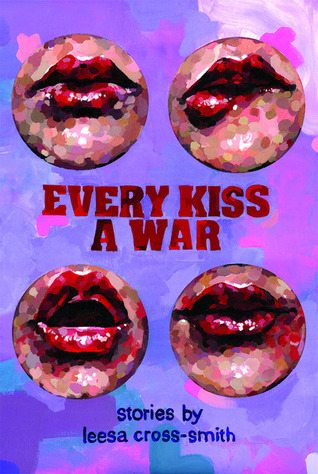Every Kiss a War (Mojave River Press, 2014) is a collection of short and short-short stories by Leesa Cross-Smith. The sentence structure tends to be fairly simplistic, and the theme is often love in Kentucky. While Every Kiss a War might sound deceptively simple, the stories within radiate with a unique light that stunned this reader.

The characters in Cross-Smith’s stories are described as extremely perceptive, even when they don’t makes choices based on what they see and know. In “And It Can Never Be Too Dark or Too Bright,” the narrator describes her two beaus. One of them “…kisses like a dying man. He kisses like he worships women. Your mouth is his church.” Here, it is less that the man is smooth, but that the woman is perceptive as the focus. Death/worship/church all go together, but the images are a bit off kilter for romance. In this case, though, Cross-Smith makes it work because the way the narrator’s beau treats her is deadly serious, which must be deduced.
A moment of clarity doesn’t have to be explained, a kindness that Cross-Smith extends to her readers. In “Kentucky Sugar,” a thirty-five-year-old woman takes a younger lover. She gives him an orange ball cap to wear when he visits one day, which we learn originally belonged to her ex-husband. When the ex shows up to pick up some of his things only to see the young guy in his old hat, things get heated. After the ex leaves, the woman decides she must do something:
She snatches the orange ball cap from the floor and goes into the kitchen. I [the young lover] follow her. She shoves it into the garbage can, smashes it down. She takes a big ladle of sauce from dinner, pours it in there, too. “Alright,” she says after she’s finished.
In these brief sentences, it dawned on me that the woman had thrown the hat–a memory of the ex-husband–into the trash before. By mashing it down, she’s pushing it into the filth, but to prevent herself from removing the hat later, she makes it a mess with a ladle of wet food. None of these thoughts are told to the reader; we get it on our own in a way that allows us to join the moment.
Although the woman and her hat don’t seem definitively strong, women are in control in this collection. When a young woman leaves her boyfriend, who previously had many lovers that he dumped for her, she breaks up with him via a note stuck in his cigarettes:
Come on. I am a lioness on a big, hot rock. I told you that.
The woman makes the final decision, her way, and unapologetically. Even the repeated vowels–“o” in particular–give the words a strong sound in the reader’s ear.
Some of the strong characters may not be likable to the reader, say, if you hate cheating or women in control of their sex lives. For me, it’s not about questioning whether a character’s decisions match my personal values, but how well those decisions are sewn into the fabric of the character. Read this example of a woman who has now run away from her husband, Dominic, twice, and is thinking of having sex in the middle of the night with a veritable stranger name Roscoe in the dugout of a baseball field:
And I thought about how maybe if Dom got there a little to early, he’d catch the end of it. He’d stand there and watch Roscoe’s ass tighten and let go, my skirt hitched up somewhere by my ribcage, my brown legs and cowboy boots wilding up into the hot-breath night air. My panties pushed to the side like they were nothing. I’d say hold on, hold on, to Dominic and he’d stand there and watch us panting like animals. My mouth pressed against Roscoe’s ear, begging underneath that tight sky and half-moon.
Maybe before he threw me over his shoulder, took me home, got me pregnant and made me a good, decent wife and mom–my husband would stand there and wait until I was finished. On the drive back home I’d feel a little bad, tell him what a good boy he was. Make promises, pat his head. Let his rough, pink tongue lick my hand.
Now, readers may feel that the narrator telling her husband where she is so he can come pick her up on to see her cheat and then have him beg like a dog later is deplorable. However, given the personality of this character established earlier in the story, her strength–her ability to act without permission or guilt–is magnificent. We typically see women waiting at home for adulterous husbands, women crying because they don’t understand how sex can mean nothing and that her husband can still love her. Here, the roles are reversed, and I applaud Cross-Smith’s ability to make me understand the unsavory person.
“Whiskey and Ribbons” is my favorite piece. It stands out not only because the situation is different from many other stories in the book–Evangeline’s husband is killed in the line of duty, leaving her a pregnant widow–but because the emotions got into me and made me join in like some concerned neighbor or relative. The grief of Evangeline is so visceral, and Dalton, her husband’s friend who now lives in her house, is such a good person. Dalton sleeps in his own room, never makes a move on Evangeline, and helps care for the new baby. There are so many good people in the story that only grief seems to be the villain, which is unusual. Watching the minor characters state concern about Evangeline’s living situation and grief adds sprinkles to the flavorful story, but it also makes the reader–and Evangeline–wonder if she’s making good decisions. Eventually, Evangeline comes to a philosophy about how to live:
I listened for it then and I’m still listening for it now. I am always putting my ear down to the railroad tracks, waiting for the distant, low rattle and rumble of something coming to heal me.

What a twist! In a surprising moment, Cross-Smith describes the sound of a train, which usually spells danger, as something that could be healing. Trains are powerful and can be fast-moving. Perhaps this is what she means? Dalton might be the train; regardless, the author leaves me in this woman’s head to consider her life and the way she chooses to deal with tragedy. Never once did I feel the need to impose my beliefs on Cross-Smith’s characters because she gives them so much life that I accept them–like real people.
Some short story collections blur together, but I really remember a lot of these stories, even if I don’t remember the names of the characters: The girl who had an abortion and lives with her friend and her friend’s mom. The man who meets up with the woman who owns the coffee store. The professor who lives in France. The newlyweds who have kids the same age. I highly recommend Every Kiss a War. If you are on Goodreads, Leesa Cross-Smith loves to reach out to readers. To find out more about her, please check out her Meet the Writer feature published here on Grab the Lapels!

Whoa, this sounds interesting. And why have I heard of her? I’ve heard of her.
LikeLike
Not sure. She’s ready to contact if you’re looking for a reviewer’s copy!
LikeLike
Really cool cover! I love how you mentioned that your beliefs never played a part- characters that are that dynamic are often hard to find. And the dog imagery in the Dominic Roscoe story was really well done. Great review!
LikeLiked by 2 people
Thanks, NP! This really is a fantastic collection that I loved greatly. Most collections are hit-and-miss, as many of us known, but not this one. If you are on Twitter or Goodreads, as I mentioned, Leesa Cross-Smith loves talking to people.
LikeLiked by 1 person
I’ll reach out for sure! I just saw the author interview as well 🙂
LikeLiked by 1 person
This sounds like a really interesting collection – love the quotes! One for the wishlist…
LikeLiked by 1 person
A very powerful writer. I know you’re on Twitter, so you can contact her, if you wish, and request a reviewer’s copy.
LikeLiked by 1 person
Oooh, a post you wrote before I even *started* blogging. How fun! I can tell your blogging style has changed subtly over the last few years. For the better, I promise. 🙂
Are all the relationships in this book heterosexual ones? All the examples you give above are. It’s something I’ve started to notice separates books from the early 2000’s to the 2010’s; in the 2010’s there are a lot more LGBTQ+ stories that pop up. Particularly in story collections above love.
LikeLike
I had to go back and read this review to respond to you, and interestingly, I remembered some of the quotes, which I believe speaks well of Cross-Smith as a writer. If I remember correctly, the book is really sensual, and women aren’t laden with shame that I feel like I see in a lot of fiction. They knew they’re the stuff. Though I’m guess, Cross-Smith LOVES MEN, just all of them, all their smells and looks and things they do. At least, based on her writing, the narrator’s are always “boy crazy” women, even if those women are “boy crazy” about men. Transpose the feelings most girls had in high school and carry it into adulthood. Personally, I love it because it’s a feeling I know well. I was not good at having one crush, but one crush for each class period.
LikeLiked by 1 person
Hahaha– I could TOTALLY see you having one crush per class period! XD An out of sight out of mind thing? 😉 I never understood the whole boy-crazy thing. I didn’t develop crushes often. In fact, I didn’t have a single crush in college, now that I think about it. Weird.
I’m so glad Cross-Smith’s writing stuck with you like this! That’s a great sign for me. I look forward to reading her work. ❤
LikeLike
Boys are just so dang pretty. My great-grandma said that she pictured heaven like this: she’s sitting under a willow tree surrounded by beautiful men. I’m definitely my grandma’s girl. And it’s not even a standard handsome thing, it’s a cute personality or clothing style or whatever.
LikeLiked by 1 person
EXACTLY. For me, cute boys are 110% well-kept with a great personality. If you have a pretty face, I most often don’t look twice until I know who you are. Thankfully, this lead me to David. His mind and his heart snagged me. Gosh darn it. 😉
LikeLiked by 1 person